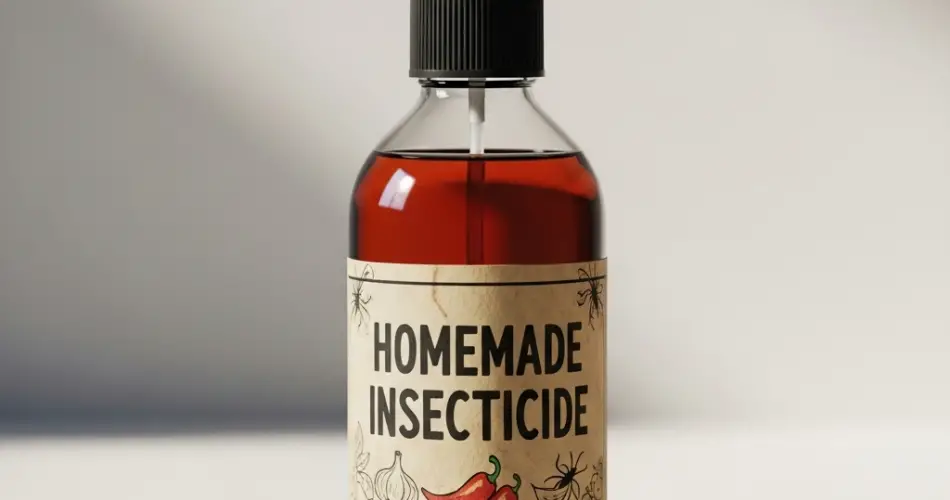Pests and plant diseases are among the most common problems faced by gardeners. Aphids, whiteflies, spider mites, and mealybugs can quickly turn a thriving plant into a withering mess. Fortunately, there are safe, effective, and budget-friendly ways to protect your garden—starting with ingredients you likely already have at home.
This guide presents a natural insecticide solution that can help eliminate many types of pests without the use of synthetic chemicals. Whether you’re growing vegetables, herbs, flowers, or houseplants, this DIY insecticide is gentle on your plants while tough on bugs.
Why Use a Homemade Insecticide?
Store-bought insecticides can be effective, but they often contain harsh chemicals that may harm beneficial insects, pollinators, pets, or even people. Over time, pests may also develop resistance to these commercial formulas.
In contrast, natural insecticides made with everyday kitchen ingredients:
-
Are safe for children and pets
-
Don’t pollute the environment
-
Target a wide range of garden pests
-
Can be applied regularly without damaging the plants
With a few simple steps, you can mix a powerful pest deterrent that helps maintain the balance of your garden ecosystem.
What You’ll Need
To create this homemade insecticide, gather the following ingredients:
-
1 liter of water
-
1 tablespoon of baking soda
-
1 tablespoon of liquid dish soap (biodegradable, unscented)
-
2 tablespoons of vegetable oil (such as sunflower or olive oil)
-
Optional: 2 crushed garlic cloves or a pinch of chili powder for added pest resistance
These ingredients work together in harmony:
-
Soap breaks down the waxy coating on pests like aphids and mealybugs, dehydrating them.
-
Oil suffocates insects by blocking their breathing pores.
-
Baking soda has antifungal properties, helping to prevent diseases like powdery mildew.
-
Garlic and chili deter pests with their pungent smell and irritant properties.
How to Prepare the Solution
-
Mix the baking soda with water in a spray bottle or container.
-
Add the dish soap and vegetable oil.
-
Stir or shake well until fully blended.
-
If using garlic or chili, let them steep in the mixture for about 30 minutes, then strain the liquid before use to avoid clogging the spray nozzle.
Always test the solution on a small section of a plant before full application to check for any sensitivity or adverse reaction.
How to Apply
Spray the mixture generously on both the top and underside of leaves, as well as on stems and soil surface around the plant. Most pests hide on the undersides of leaves or in leaf axils, so ensure thorough coverage.
Best time to apply:
-
Early morning or late afternoon, when the sun is not too strong
-
Avoid applying in direct sunlight to prevent leaf burn
-
Repeat every 3–5 days for active infestations
-
As a preventative measure, apply once every 7–10 days
Pests It Helps Control
This homemade spray is effective against a wide variety of common garden pests, including:
-
Aphids
-
Whiteflies
-
Spider mites
-
Thrips
-
Mealybugs
-
Fungus gnats
-
Scale insects (soft-bodied)
-
Caterpillars (you may need to apply more frequently)
The oil and soap suffocate small soft-bodied insects, while the garlic and chili act as a repellent.
Additional Tips
-
Use freshly prepared solution each time for maximum effectiveness. The ingredients degrade over time, so it’s best not to store the mixture for more than 24 hours.
-
Don’t overdo it—excessive spraying can stress plants. Always monitor your plants’ reactions.
-
Combine with good garden hygiene: Remove dead leaves, control weeds, and encourage beneficial insects like ladybugs and lacewings.
-
For indoor plants, make sure to ventilate well after spraying and avoid spraying directly onto flowers.
Prevention Is Key
While this natural insecticide is effective, preventing infestations in the first place is always the best strategy. Here’s how to reduce the risk of pest problems:
-
Avoid overwatering—damp soil attracts fungus gnats and root rot
-
Rotate crops in vegetable gardens
-
Regularly inspect plants for early signs of pest activity
-
Keep tools and pots clean
-
Encourage biodiversity in your garden
Conclusion
Dealing with plant pests doesn’t have to mean reaching for synthetic chemicals. This simple homemade insecticide offers a safe and environmentally friendly way to protect your plants and promote a healthy, thriving garden. With regular use, careful observation, and good gardening practices, you can keep pests at bay and help your plants flourish naturally.



